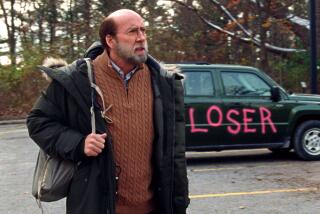‘Wicker Man’ can’t match the original
- Share via
It probably seemed like a good idea on paper. Nicolas Cage, turned on to the ‘70s British cult item “The Wicker Man,” produces and stars in a remake and dedicates the new film to the friend who introduced him to the original, the late Johnny Ramone.
The original film -- in which an unwavering, deeply religious police officer searches for a missing little girl on a remote island where he becomes ensnared by a free-love-ish pagan cult -- was a minimalist, chilling examination of strained beliefs, the conflagration of blinkers-on conviction and groovy open-mindedness. Part mystery, part musical and all-the-way weird, the original is a singular work of strange, unnerving power.
Writer and director Neil LaBute is a theoretically inspired choice for the remake. His films, from his debut, “In the Company of Men,” to his most recent, “The Shape of Things,” are dissections of power dynamics.
As LaBute has a particular appetite for the war of the sexes, he turns the island into some sort of matriarchal commune, so that Christopher Lee’s character from the original, Lord Summerisle, has become Ellen Burstyn’s Sister Summersisle in the new version. He keeps the main thread of the story line and relocates the action from Scotland to Washington state. All notionally well and good.
The film one might expect from LaBute, the chilly, cerebral mediation on power plays and gender roles, is sort of hiding in the bushes. LaBute’s strength has always been in his dialogue, and the structural demands of a more conventional horror film repeatedly trip him up.
To ratchet up the suspense and motivation, Cage is given an emotional trauma to overcome, a physical ailment to make him vulnerable and a personal connection to make him more attached. Part of what made the original so spooky in the first place was how spare it was, leeched of all the trappings LaBute chooses to stuff in.
The remake is surprisingly faithful to the conclusion of the original, the finale being that film’s most famous sequence. It’s all there -- the animal masks, the burning effigy, the cruel revelations -- ultimately undercut by a ridiculously unnecessary “six-months-later” coda.
At one point Cage’s character has a double-scare dream-within-a-dream, and his own frustration at his predicament perfectly (and comically) mirrors that of the audience, who are asked to wait patiently for terrors that never come and a creepiness that doesn’t quite settle in. In the end, LaBute’s remake is an interesting idea that never transforms into a particularly satisfying movie.
*
‘The Wicker Man’
MPAA rating: PG-13 for disturbing images and violence, language and thematic issues
A Warner Bros. release. Writer-director Neil LaBute. Based on a screenplay by Anthony Shaffer. Director of photography Paul Sarossy. Editor Joel Plotch. Running time 1 hour, 43 minutes.
In general release.
More to Read
Only good movies
Get the Indie Focus newsletter, Mark Olsen's weekly guide to the world of cinema.
You may occasionally receive promotional content from the Los Angeles Times.











